
5 Free and Easy Website Builders to Help Get your Business Up and Running
A website is an absolute necessity for your business—period. This may feel scary for you but fear not. With the help of one of the many great website builders on the market today, you can get your business up in less than an hour – and for free. Here are 5 free and easy website builders to get your business started today.
1. How To Choose a Website Builder for Your Business
Methodology
After extensive research, we’ve selected the most popular free website builders according to the features they offer customers, including storage, mobile responsiveness, editing, template abilities and marketing tools.
How To Choose a Website Builder for Your Business
Choosing the best fit website builder for you and your teams depends on what your business needs. Consider these factors as you choose the right tool for you:
- Hosting and domain: Does the free builder come with shared hosting and a free domain? How much traffic can the free version handle?
- Design: Do the available templates and customisation options fit your brand? Do the free themes and templates include features that serve your needs? Consider elements around the text you use and photography involved.
- CMS: Is the blog and CMS sophisticated enough (or too complicated) for the ways you use content in your business? Is your business using more images, heavy text or product-based?
- Ease of use: How easily can you make updates and changes? Do you have to hire a web designer or other specialist to keep the website up to date?
- Autonomy and customisation: How much control do you have over the look and feel of your website? Do you have to sacrifice functionality? Will your customers see ads for other businesses?
- Mobile compatibility: Every modern website builder should automatically include mobile responsive design. If you don’t see that, opt for a different builder.
Taking into account how each of these elements play into your brand and business will make it easier when you view different options. To help you make an informed decision, we’ve included all of the facts in this article – including what each builder does offer.
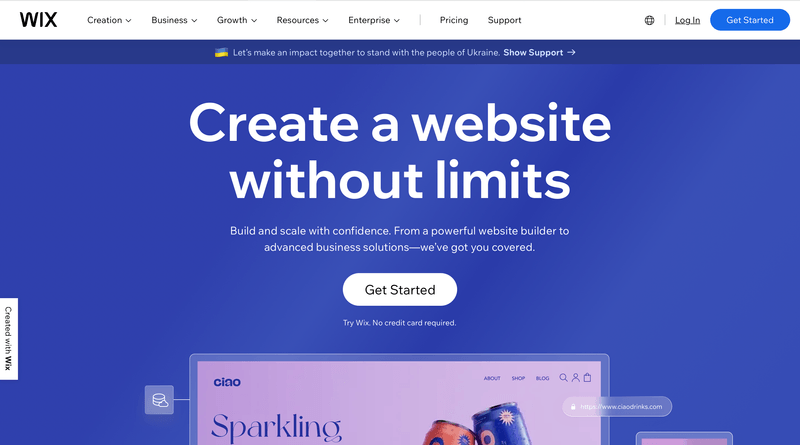
2. Best Overall Website Builder
Undoubtedly, Wix stands as the premier all-inclusive website builder available today. Its user-friendly interface makes it incredibly easy to navigate, and even on the free plan, it offers a range of features, granting you complete creative autonomy through its intuitive drag-and-drop editor.
The free plan includes a generous 500MB of storage and bandwidth, alongside access to crucial features, including SEO tools. While the free domain provided by Wix may not be the most captivating, you have the freedom to personalise it to align perfectly with your brand. This places Wix at an advantage over other builders, where you're confined to a non-editable domain.
What we like about Wix:
- Customization options – we could drag anything anywhere, making it easy to line things up exactly how we wanted them!
- Template choices & designs – our chosen template already had a menu built-in.
- Ease of use – changing text, images, and backgrounds only took a few clicks. Wix even has an image library on hand, which makes it even faster!
- Improved SEO features – we noticed a real improvement to Wix’s SEO offering, including a partnership with keyword support tool, Semrush.
- Mobile editor – see how your website looks on mobile devices thanks to Wix’s mobile editor and make sure your pages are optimised for every visitor. This could be essential for your business as the latest statistics show that 1 in 5 people are spending upwards of 4.5 hours on their mobile — you’ll want these visitors to be able to scroll through your website without hassle.
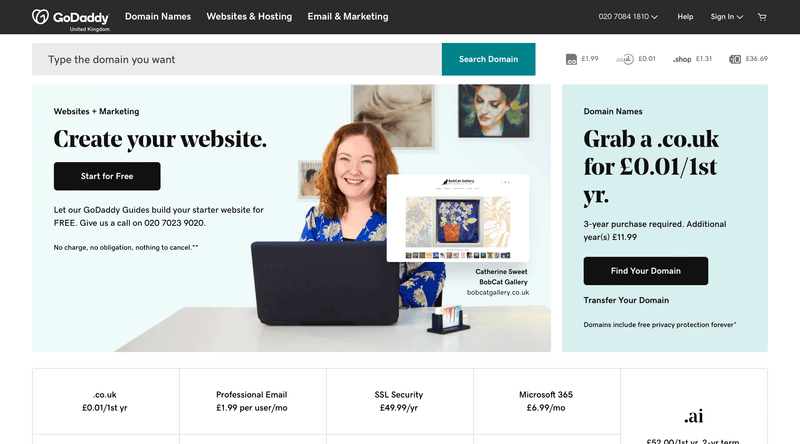
3. For Getting Online Quickly
GoDaddy is pretty user-friendly, coming in second for ease of use in our rankings, thanks to its AI functionality that builds your website based on a few answered questions. This saves you tons of time and gets your site online quickly.
What we liked about GoDaddy:
- Easy set up – like Wix, GoDaddy asks you what sort of website you want to create and what your business name is, and then gives you custom themes to work with.
- SEO features – by heading over to “Get found by Google” in the Settings, you can start optimising your website in just a few clicks. There’s no need to dive into SEO lessons before building.
- Efficiency – GoDaddy saves you tons of time thanks to its AI functionality, making it one of the fastest website builders on the market today. However, because of its efficiency, it limits the amount of creativity allowed. If branding and customisability is important to you, GoDaddy may not be the right choice.
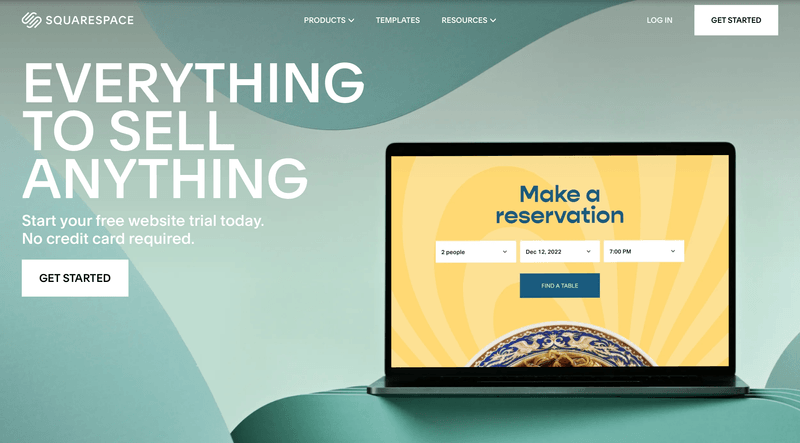
4. For the Modern Designer
Squarespace is a website building and hosting platform that allows users to create and manage their own websites without needing extensive technical knowledge.
It provides users with a variety of customisable templates, drag-and-drop tools, and integrated features, such as e-commerce capabilities, to help them create a professional-looking website.
What we like about Squarespace:
- Built-in SEO tools and Analytics - A huge plus to squarespace is your ability to learn where your website traffic is coming from, what your visitors are looking for, and how they’re interacting with your content or products.
- Drag and drop feature and variety of design options - this platform is especially catered for those in creative industries such as interior design, photography, portfolios and online stores.
- Hire an expert - If you like Squarespace but still find them overwhelming to use, they offer a “hire an expert” solution. Squarespace Experts are experienced third-party designers and developers. Vetted for their years of experience and quality of work, they can help you polish an existing site, or build a new one from scratch.
Most users will agree that among major website builders, Squarespace is the most aesthetically pleasing one.
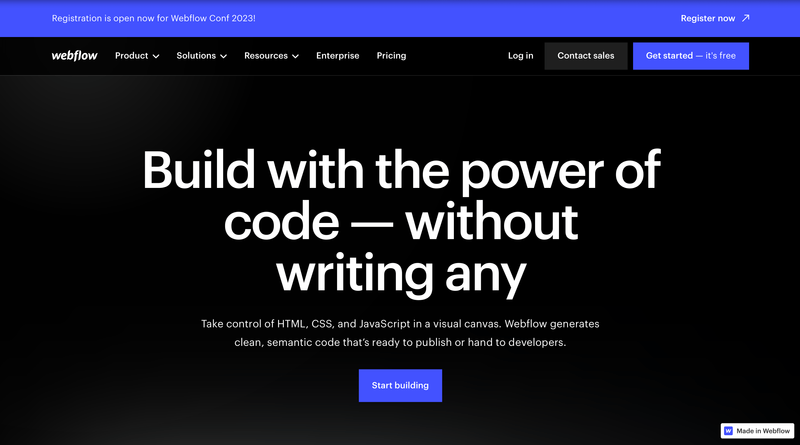
5. For the Ultimate Customisation
At a glance, Webflow is best suited for web designers and those that can handle large amounts of customisation. Instead of the usual drag-and-drop editor that Wix and GoDaddy offer, Webflow works with padding and section block areas. This format will feel familiar for website owners used to large amounts of customisation – but for your first website, this could be quite an overwhelming design process.
The building process can take a couple of hours because of how different it is from the popular drag-and-drop editor. And it’s safe to say that without any prior knowledge of using section block areas and overlays, it’ll be a little difficult to navigate at times.
What we liked about Webflow:
- Template choice and designs – Webflow makes it clear which templates are best for which industries, and offers a pretty big range of free templates compared to other builders.
- Creative freedom – Webflow gives a lot of creative control to users and its free plan comes with an array of customisable features.
- Efficient navigation – Webflow relies on the use of short keys and right-clicking to remove or add elements, which streamlines the whole design process.
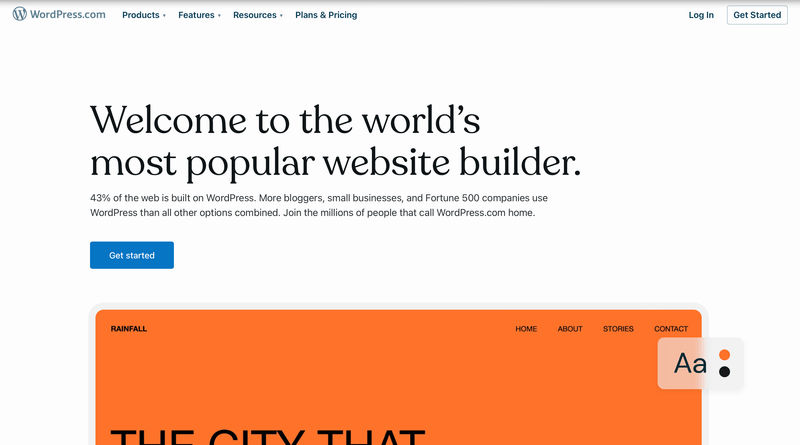
6. Best for SEO Capabilities
WordPress.com is an industry giant when it comes to blogging and SEO. WordPress is a powerful software that's less beginner-friendly than most website builder platforms.
Embraced by bloggers and journaling enthusiasts, WordPress serves as a favoured option, boasting an array of sophisticated tools and seamless integration capabilities, rendering your websites infinitely customizable. Yet, it bears mentioning that this platform comes with a competitive price tag of £20 per month. As such, we recommend it primarily for small businesses seeking to host copious amounts of content.
What we like about Wordpress:
- Strong value for money - For £20 you get access to a respectable range of features
- User friendly CMS - WordPress is a strong content management system because of its origin in blogging. It is very easy for an admin to navigate through the backend of their WordPress site, edit pages and upload new content. WordPress makes it simple to organise content without a lot of website management knowledge.
- Customisability with ‘Add-ons’ - Due to its popularity, WordPress has become the go-to platform developers to write their own add-ons. These add-ons are called ‘Plugins’ which allow you to have additional features on your website such as contact and feedback forms, lead generation for email subscribers, SEO google tracking, and social media plug-ins.
The great part about WordPress.com is that when it comes to optimising your site for search engines, it comes equipped with pretty much any SEO feature you might possibly want to get your hands on. You'll get SEO best practice prompts, keyword support, custom URLs, and more. This will help your website rank higher in the SERPs and make it easier to reach out to new potential clients.
What should a small business website include?
When it comes to using a website builder, there isn’t a one-size-fits-all solution. It’s important for you to weigh the pros, cons, and pricing based on your own needs.
If you’ve put off designing your website for long enough, get started with an easy website builder so your website is up and running. You can always work on scaling and growing your website along with your business in the future.
A small business website should have a cohesive design layout with a clear user interface and journey. While the number of pages may vary, it’s important that your target readership understands your brand story and offering, and how you can help them overcome their pain points. It’s also critical to include social proof for small business websites since they need to establish credibility. We recommend you include reviews and testimonials from previous clients along with details of your products/services.

By submitting you agree to receive newsletters as well as other promotional emails from Steppit. You may withdraw your consent at any time via the “Unsubscribe” link in any email or view our privacy policy at any time.
Read More


How to Film Videos for Your Course
The most exciting part of your course has come, it’s now time to film your videos! Many people get…

Plan your course in 5 minutes with AI
Steppit makes it easy to create and sell online courses, with the help of your AI assistant.